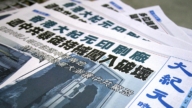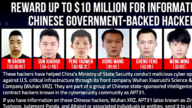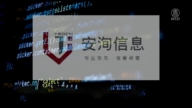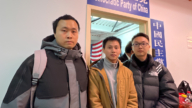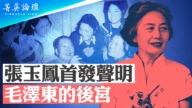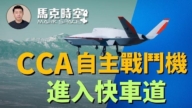【新唐人2013年01月09日讯】国际政治风险咨询公司“欧亚集团(Eurasia Group)”,最新公布的“2013年全球十大风险”排名,中共当局如何控制信息的风险被排名第二。报告说,随着一件件高官贪腐丑闻被揭露,中共在第一回合信息战中已输给人民,接下来,中共为避免不利信息影响到政权的合法性,很可能将人民的不满情绪,导向“民族主义”,因此挑起对外冲突。
最新的“全球十大风险排名”报告中说,中国广大的中产阶级教育程度日渐提高,对信息的需要增加,中共当局已无法控制敏感信息的流通。报告说,随着每一件高官的丑闻和腐败案件的揭露,都宣告着中共已输掉与人民第一回合的信息战。
“中共政权的合法性”一直被外界质疑,而自中共篡政以来,从没放弃对敏感信息的管控,近几年,随着互联网的发展,中共对网路言论的管控也不断加强,尽管不少网民因为发布敏感信息被拘捕、劳教,但是,仍然阻止不了各类敏感信息的传播。
大陆自由撰稿人刘逸明:“现在只要知情者在网路爆料,他这个事情很快就会..做为公共事件,还有一些敏感事件,像山西的水污染事件,官方最开始也是在极力控制,结果5天之后,还是被媒体所揭露,所以现在中共确定控制信息的能力是越来越弱了。”
“全球自由信息运动”创办人张新宇指出,中共控制信息流通本身就是对人性渴求的压制,早已激起中国民众的不满。
全球自由信息运动创办人张新宇:“2013年是比较有看头的一年,那么今年的年初,就出现了,比如说《南方周末》这种事件,最新吧,今天(8号),又有几百人到《南方周末》的门口去支持,像这种现象就说明了,中国老百姓以及学生已经对政府,把它们当作被骗、被忽悠的对像,已经愤怒到极点了。”
1月2号,广东省委宣传部部长庹震删改《南方周末》新年特刊,报馆编辑、记者罢工抗议﹔各界名人、学者联署力撑;7号至8号,报馆前聚集数百网民和读者前去举牌、献花声援,要求庹震下台谢罪,并要求宪政改革、新闻自由、和言论自由。
“欧亚集团”总裁伊恩.布雷默1月7号在一个电话记者会上说,“2013年,我们将会看到中国更多民族主义的表现,这是由于中共信息战的直接后果,将明显的影响到美中关系,让国家资本主义看起来更有威胁性,也让东海与南中国海发生冲突的概率升高,尤其是中国与日本的冲突。”
刘逸明表示,“民族主义”在中国确实奏效,比如跟美国或日本发生矛盾时,只要当局一鼓动,就会导致老百姓群情激愤,一致枪口对外。
刘逸明:“这个民族主义确实能够让中国人比较信服,转移中国人民的视线,但是,民族主义它不可能完全转移开,毕竟现在不是战争年代了,都是跟外国发生的一些争端而已,所以大多数还是国内的矛盾会比较突出,老百姓的注意力更多还会关注中共这个统治集团。”
“全球自由信息运动”创办人张新宇指出,当国内的矛盾演变到不可收拾的地步,威胁到中共政权的时候,它很可能发起对外的战争。
张新宇:“目前这场《南方周末》风波,我看不容易这么熄灭,如果国内出现这种情况,越演越烈的时候,很可能就会挑起钓鱼岛打起来了,那么大家的注意力就不在这里了,就转移目标,如果它挑起这种事端它也没把握赢,所以今年还是有好戏看的。”
此外,“全球十大风险”排名第五的是有关日本的风险,其中提到,随着中国与台湾、韩国的经贸关系改善,日本的技术和投资对中国的重要性已经不如以往,日本最近的选举结果,以及东海岛屿争端,都将使日本与中共的关系更为困难。
采访编辑/李韵 后制/王明宇
China’s Information Control Ranks Second in World’s Top Ten Risks
Eurasia Group, the international political risk consulting
firm, has just published “the world’s top ten risks in 2013.”
China’s control of information is ranked second.
The report said that the news of high-ranking officials’
corruption scandals has been exposed one after another.
The Chinese Communist Party (CCP) was
defeated in the first round of information warfare.
In order to avoid adverse impact on the
legitimacy of the regime, the CCP is likely
to turn public discontent into “nationalism”.
It is thought that they may provoke a foreign conflict.
The latest top ten global risk report says the majority
of the middle class with better education in China
has increased their need for information.
The CCP is unable to control the
spread of sensitive information.
Exposing every high-ranking official’s corruption
is a defeat for the CCP in the information war.
The legitimacy of the CCP has long
been questioned by the outside world.
However, since the CCP seized power, it has
never given up control of sensitive information.
In recent years, with the development of the
Internet, the CCP strengthened its control.
Despite many Internet users being arrested or sent
to forced labor camps, it still has not managed
to prevent the spread of sensitive information.
Liu Yiming, freelance Chinese writer: “As long as it’s insiders
breaking the news on the internet, it becomes a public event.
There are some sensitive issues, such as the
environmental pollution incidents in Shanxi.
Officials tried their best to control the news.
After five days, media disclosed the incident.
Thus, the CCP’s ability to control
information is getting weaker.”
Zhang Xinyu, founder of the “Global Freedom of
Information Movement,” pointed out that
the reason the CCP controls the flow of information
is to suppress human nature.
The CCP has aroused the dissatisfaction
of the Chinese people for quite a while.
Zhang Xinyu, founder of Global Freedom of Information
Movement: “Worthwhile things are happening in 2013.
At the beginning of this year, it was
the “Southern Weekly “incident.
Hundreds of people went to the
agency’s front door in support.
This means Chinese people and students felt they were
being cheated by the government, and were very angry.”
On January 2, the Guangdong Provincial Party Committee
Propaganda Minister Tuo Zhen tampered with the
“Southern Weekend" New Year special edition.
Newspaper editors and reporters went on strike in protest,
Celebrities and scholars joined in,
co-signing a petition in support.
On January 7 and 8, hundreds of Internet users
and readers were in front of to the newspaper agency.
They were holding placards and flowers asking
Tuo Zhen to step down, and offer an apology.
They also requested constitutional reform,
freedom of the press, and freedom of speech.
Eurasia Group President Ian Bremer spoke in a
telephone press conference on January 7, 2013.
He said it is likely we will see more acts of Chinese
nationalism, as a result of the CCP information war.
This will significantly affect US-China relations,
and make capitalism be more threatening.
It also raises a possibility of conflict in the East China Sea
and South China Sea, especially with China and Japan.
Liu Yiming commented that nationalism works well in China.
When China had conflicts with the United States
or Japan, as long as the CCP agitated it a little,
the Chinese people would immediately unite together,
turning their internal anger toward the foreign country.
Liu Yiming: “Nationalism can really help to shift the
attention of Chinese people, but not completely.
This is because it is not a time of war, and there
are only small conflicts with foreign countries.
Domestic conflicts would be more obvious, and the
public attention will be more focused on the CCP.”
Zhang Xinyu, founder of Global Freedom of Information
Movement: “When domestic conflicts evolve into
irreversible threats to the Chinese Communist
regime, it is likely that it will launch a foreign war.”
Zhang Xinyu: “This Southern Weekly
incident is posing hard to quieted down.
If it becomes more significant, it might
provoke a fight over the Diaoyu Islands.
Then everyone’s attention will shift to there instead.
Even if it can provoke such an incident,
winning that war is uncertain.
Thus, this is a very good year and
we have a lot to look forward to.”
China’s conflict with Japan is ranked
fifth among the world’s top ten risks.
The report also mentioned China’s trade and economic
relations with Taiwan and South Korea having improved.
This has seen the importance of Japanese
technology and investment in China decreasing.
The outcome of Japan’s recent election and the
East China Sea island dispute will create more
difficulties in a Sino-Japan relationship.


